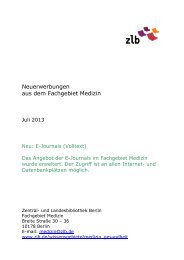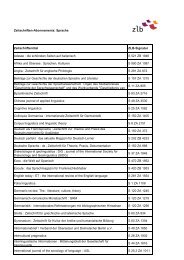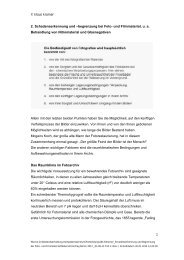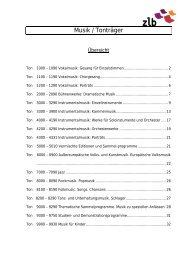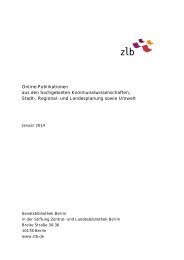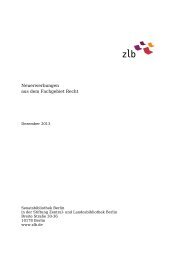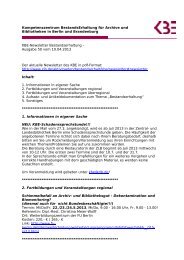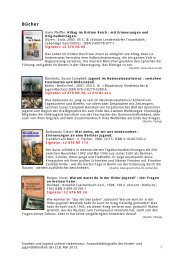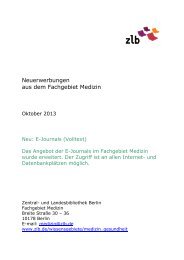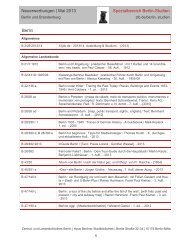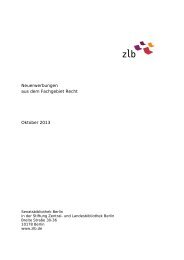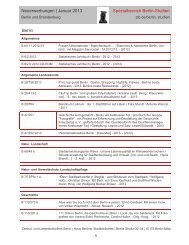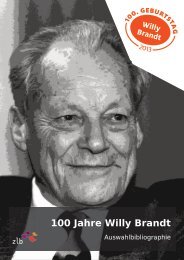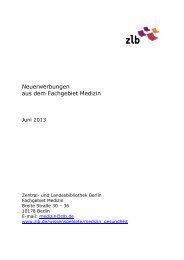- Seite 1 und 2: 12. Exkurs: Die Frankfurter Schule
- Seite 3 und 4: Husserl, Heidegger, Funke and Germa
- Seite 5 und 6: sac. Habermas proceeds to criticize
- Seite 7 und 8: Verlagsanst. 1965. X, 222 S. OLwd (
- Seite 9 und 10: Husserl, Heidegger, Funke and Germa
- Seite 11 und 12: 1132 HORKHEIMER, Max, Sozialphiloso
- Seite 13 und 14: 1141 KOFLER, Leo: MARXISMUS UND ANT
- Seite 15 und 16: 1146 MARCUSE, Herbert, Ideen zu ein
- Seite 17 und 18: 13. Französische Philosophie im 20
- Seite 19 und 20: Husserl, Heidegger, Funke and Germa
- Seite 21 und 22: 1172 BERGSON, Henri, Zeit und Freih
- Seite 23 und 24: 1181 BRUNSCHVICG, Léon, Le progrè
- Seite 25 und 26: Husserl, Heidegger, Funke and Germa
- Seite 27: which has a tendency to consider th
- Seite 31 und 32: Husserl, Heidegger, Funke and Germa
- Seite 33 und 34: Husserl, Heidegger, Funke and Germa
- Seite 35 und 36: Husserl, Heidegger, Funke and Germa
- Seite 37 und 38: dänischen Staatskirche; der zunäc
- Seite 39 und 40: 1266 MAYZ VALLENILLA, Ernesto, De l
- Seite 41 und 42: clear Disarmament« (1958), des »C
- Seite 43 und 44: Whitehead, Alfred North (1861-1947)
- Seite 45 und 46: V. GEBIETE DER PHILOSOPHIE UND PRAK
- Seite 47 und 48: 15. Wissenschaftstheorie und Streit
- Seite 49 und 50: 1291 BANDMANN, Günter, Hans BLUMEN
- Seite 51 und 52: 1309 DÜHRING, Eugen, Logik und Wis
- Seite 53 und 54: 1325 HABERMEHL, Werner, Historizism
- Seite 55 und 56: Fields of Philosophical Research an
- Seite 57 und 58: 1357 LORING, L. M., Two kinds of va
- Seite 59 und 60: 1374 PLANCK, Max, Neue Bahnen der p
- Seite 61 und 62: Darwin‘s idea of „the survival
- Seite 63 und 64: Fields of Philosophical Research an
- Seite 65 und 66: 1402 UEBERWEG, Friedrich, System de
- Seite 67 und 68: 1412 AMMANN, Hermann, Die menschlic
- Seite 69 und 70: 1429 BUBNER, Rüdiger, Konrad CRA-
- Seite 71 und 72: 1445 FREY, Gerhard, Sprache - Ausdr
- Seite 73 und 74: 1459 JÜNGER, Friedrich Georg, Spra
- Seite 75 und 76: 1471 LIEBRUCKS, Bruno, Erkenntnis u
- Seite 77 und 78: 1485 PORZIG, Walter, Das Wunder der
- Seite 79 und 80:
17. Ästhetik und Formen der Kunstb
- Seite 81 und 82:
1503 BAUMEISTER, Willi, Das Unbekan
- Seite 83 und 84:
1520 FELDMAN, Valentin, L’esthét
- Seite 85 und 86:
Fields of Philosophical Research an
- Seite 87 und 88:
Fields of Philosophical Research an
- Seite 89 und 90:
1559 LÜTZELER, Heinrich, Kunsterfa
- Seite 91 und 92:
Fields of Philosophical Research an
- Seite 93 und 94:
1594 SCHNEIDER, Albert, Der Gegenst
- Seite 95 und 96:
Fields of Philosophical Research an
- Seite 97 und 98:
17.2 Literatur und Theater 1627 ALL
- Seite 99 und 100:
Fields of Philosophical Research an
- Seite 101 und 102:
1660 GLOCKNER, Hermann, Fundamental
- Seite 103 und 104:
Fields of Philosophical Research an
- Seite 105 und 106:
1695 LAUSBERG, Heinrich, Handbuch d
- Seite 107 und 108:
Fields of Philosophical Research an
- Seite 109 und 110:
Fields of Philosophical Research an
- Seite 111 und 112:
Fields of Philosophical Research an
- Seite 113 und 114:
Fields of Philosophical Research an
- Seite 115 und 116:
Fields of Philosophical Research an
- Seite 117 und 118:
18. Ethik, Recht und politisches Ha
- Seite 119 und 120:
Fields of Philosophical Research an
- Seite 121 und 122:
1826 CASTELLI, Enrico, Raymond PANI
- Seite 123 und 124:
1844 FEHR, Hans, Recht und Wirklich
- Seite 125 und 126:
Fields of Philosophical Research an
- Seite 127 und 128:
1878 HÖLSCHER, Emil Erich, Sittlic
- Seite 129 und 130:
weltanschauulichen Konzeptionen von
- Seite 131 und 132:
Fields of Philosophical Research an
- Seite 133 und 134:
Fields of Philosophical Research an
- Seite 135 und 136:
Fields of Philosophical Research an
- Seite 137 und 138:
1969 SHEA, W. R., B. SITTER (Hrsg.)
- Seite 139 und 140:
Fields of Philosophical Research an
- Seite 141 und 142:
2003 WILI, Walter: HORIZONTE DER HU
- Seite 143 und 144:
Fields of Philosophical Research an
- Seite 145 und 146:
2018 BARTH, Karl, Zur Genesung des
- Seite 147 und 148:
Martin Buber (1878-1965) Fields of
- Seite 149 und 150:
Fields of Philosophical Research an
- Seite 151 und 152:
Fields of Philosophical Research an
- Seite 153 und 154:
2054 FLÜGEL, Heinz, Mensch und Men
- Seite 155 und 156:
Fields of Philosophical Research an
- Seite 157 und 158:
2087 KAMLAH, Wilhelm, Wissenschaft,
- Seite 159 und 160:
Gabriel Marcel (1889-1971) Bedeuten
- Seite 161 und 162:
Fields of Philosophical Research an
- Seite 163 und 164:
Fields of Philosophical Research an
- Seite 165 und 166:
Fields of Philosophical Research an
- Seite 167 und 168:
Fields of Philosophical Research an
- Seite 169 und 170:
Fields of Philosophical Research an
- Seite 171 und 172:
nahm er die Deutschen in Schutz und
- Seite 173 und 174:
Fields of Philosophical Research an
- Seite 175 und 176:
2192 WENGST, Klaus (Hrsg.), Didache
- Seite 177 und 178:
Fields of Philosophical Research an
- Seite 179 und 180:
Fields of Philosophical Research an
- Seite 181 und 182:
2243 HILDEBRAND, Dietrich von, Die
- Seite 183 und 184:
2257 KOFLER, Leo, Zur Geschichte de
- Seite 185 und 186:
Fields of Philosophical Research an
- Seite 187 und 188:
Fields of Philosophical Research an
- Seite 189 und 190:
Fields of Philosophical Research an
- Seite 191 und 192:
Fields of Philosophical Research an
- Seite 193 und 194:
Fields of Philosophical Research an
- Seite 195 und 196:
Fields of Philosophical Research an
- Seite 197 und 198:
2325 SCHELSKY, Helmut, Auf der Such
- Seite 199 und 200:
Fields of Philosophical Research an
- Seite 201 und 202:
2356 VEIT, Otto, Die Flucht vor der
- Seite 203 und 204:
Einheit der Bürokratien? Forschung
- Seite 205 und 206:
2392 ELERT, Werner, Prolegomena der
- Seite 207 und 208:
Fields of Philosophical Research an
- Seite 209 und 210:
Fields of Philosophical Research an
- Seite 211 und 212:
VI. DIE PHILOSOPHIE VOR KANT UND PH
- Seite 213 und 214:
the pro-Macedonian government in At
- Seite 215 und 216:
Bd 1/1. Kategorien. Übersetzt und
- Seite 217 und 218:
2451 CICERO: CAMARERO, Antonio, Cic
- Seite 219 und 220:
demie der Wissenschaften und der Li
- Seite 221 und 222:
Platon (427-347 vor Chr.) Der bedeu
- Seite 223 und 224:
2487 HEITSCH, Ernst, Erkenntnis und
- Seite 225 und 226:
Drei Schriften zur Philosophie Plot
- Seite 227 und 228:
und Strebens in den frühen Dialoge
- Seite 229 und 230:
Gesetzen. 3.) S. verderbe die Jugen
- Seite 231 und 232:
2505 EBERT, Theodor, Sokrates als P
- Seite 233 und 234:
and besieged with prayers, threats,
- Seite 235 und 236:
2529 PIEPER, Josef, Philosophia neg
- Seite 237 und 238:
2535 SVOBODA, Karel, La estetica de
- Seite 239 und 240:
2551 ECKEHART: ROLOFF, Ilse, Meiste
- Seite 241 und 242:
2567 LACTANTIUS, De ira dei. Vom Zo
- Seite 243 und 244:
1584 as a member for Melcombe in Do
- Seite 245 und 246:
2578 BACON, Franz, Über die Würde
- Seite 247 und 248:
dern), die illustrierte Janua, der
- Seite 249 und 250:
thus that sceptics must be mistaken
- Seite 251 und 252:
2602 GREYERZ, K. v., Vorsehungsglau
- Seite 253 und 254:
2612 HUBATSCH, W. (Hrsg.), Absoluti
- Seite 255 und 256:
der in Heidelberg, Luther set out h
- Seite 257 und 258:
Halle, Niemeyer 1937. VIII, 252 S.
- Seite 259 und 260:
sche Religiosität nieder, was bish
- Seite 261 und 262:
By producing such a work, he could
- Seite 263 und 264:
2663 BAYLE, Pierre, Selections from
- Seite 265 und 266:
2671 D‘ALEMBERT, Jean le Rond, Ei
- Seite 267 und 268:
2685 HUME: RABADE ROMEO, Sergio, Hu
- Seite 269 und 270:
engineer he worked on calculating m
- Seite 271 und 272:
2704 LABROUSSE, Roger P., En torno
- Seite 273 und 274:
he had his first experience of fore
- Seite 275 und 276:
2720 MIRABEAU: ERDMANNSDÖRFFER, Be
- Seite 277 und 278:
qualities were added a pronounced e
- Seite 279 und 280:
zur deutschen und französischen Au
- Seite 281 und 282:
Band 4. FRITZ, Kurt, Gleichheit, Ko
- Seite 283 und 284:
Rechtsquellenlehre und zur antiken
- Seite 285 und 286:
2752 BARTH, Heinrich, Philosophie d
- Seite 287 und 288:
2764 FRAGA, Gustavo de, Depois do X
- Seite 289 und 290:
storia, pedagogia, letteratura, soc
- Seite 291 und 292:
sicht auf den klassischen Unterrich



